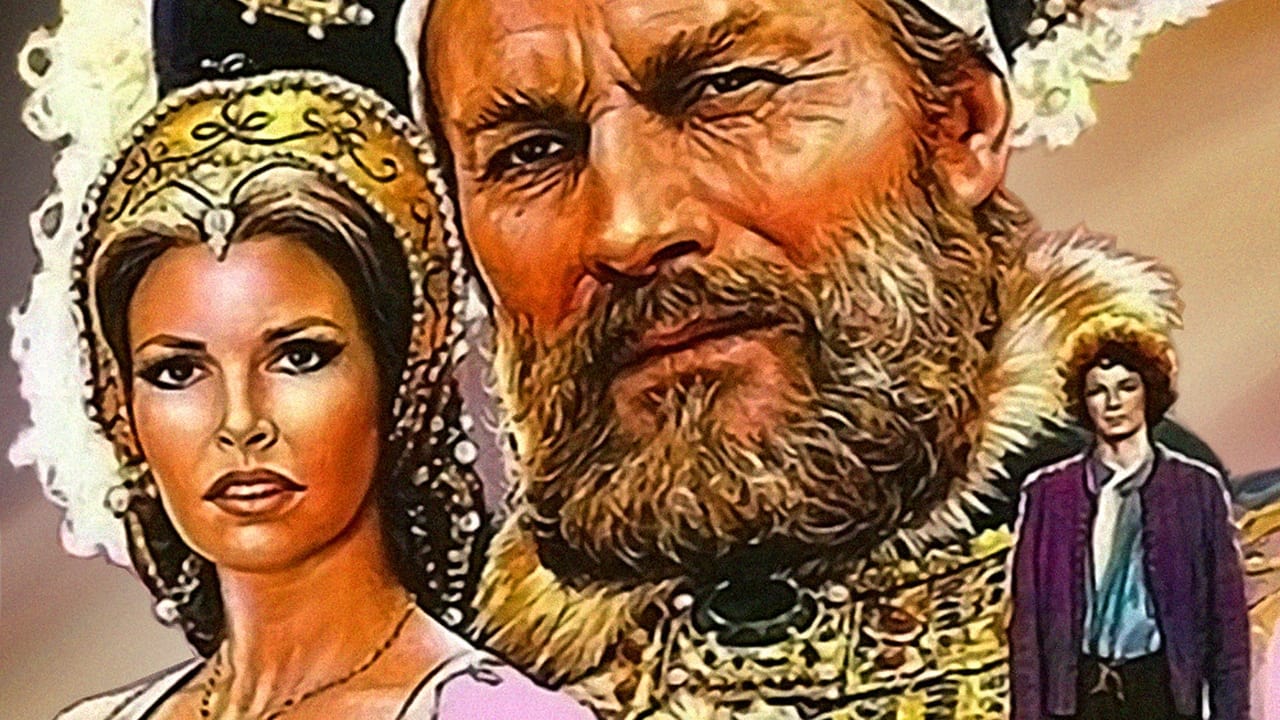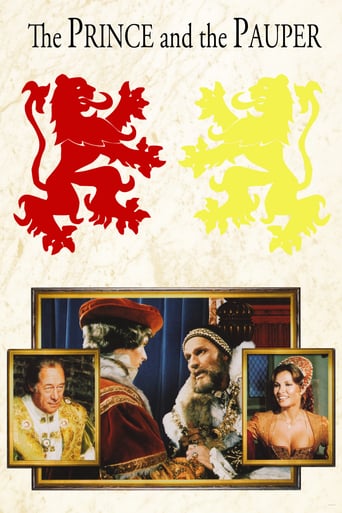

Some things I liked some I did not.
... View MoreBrilliant and touching
... View MoreWhat a freaking movie. So many twists and turns. Absolutely intense from start to finish.
... View MoreOne of the best movies of the year! Incredible from the beginning to the end.
... View MoreThis film has a lot to recommend it. It is has some rather beautiful scenes (the scene of Henry VIII on his deathbed with his jester at the foot of the bed lingers long in the memory and deserves to be in a better film), some good fights and an all-star cast. Oliver Reed in particular puts in his usual charismatic performance. There is some impressive technical wizardry by which Mark Lester is made to appear as his own twin. But I agree with other reviews that Lester is not up to the task of the central role unfortunately. He is too old, for a start. That would not not necessarily be a problem except he is involved in some fight scenes and appears to be too gangly and delicate an adolescence to be able to best his opponents. Nor does he have much presence and one gets the distinct impression that the all star cast was drafted in to distract from his rather dull performance. Still it is worth watching.
... View MoreLets get the bad point out of the way quickly. Mark Lester. Wait, what am I saying? I'm not a sheep! Lester was excellent! If others do not think he cuts it is probably because he's acting against gods of Hollywood, HESTON, REED, G C SCOTT, REX HARRISON and EARNEST BORGININE. But I think he performed most admirably in dual roles which he played quite distinctly apart and with a modest amount of charisma. So thats the non existent bad point out of the way. Now let me throw in what really rocks the movie. Lets start with Charlton Heston as King Henry VIII. Majestic, funny, and brutal. He well and truly steals every second of screen time he's on. Oliver Reed, the outcast swashbuckling hero trounces around with his usual bullish but dynamic presence, and fights in his own unique Reed style. George C Scott turns in yet another memorably hilarious (if rather too short) comedic role as an ex monk turned king of thieves. Rex Harrison as a monk adviser to the king plays his part with ultra cool prose and wisdom. And no one plays a really bad man as good as the great Earnest Borgnine who plays the brutish evil father of the pauper. The movie is flooded with great character actors who are all clearly having fun entertaining us and boy do they entertain. The story zips along confidently. The period detail is exquisite and lavish. Raquel Welch adds to the beauty of the movie canvas. And to top it off, a wonderfully spirited soundtrack have me humming days after each time I watch this movie. Pure blissful swashbuckling entertainment.
... View MoreFor those who are expecting a straight telling of Mark Twain's story or a remake of the Errol Flynn classic, you're going to get more than you bargain for. The characters have been greatly expanded and several new ones have been created to give the plot a little more body.Mark Lester, nine years after being the screen's Oliver, plays the dual role of Edward Tudor who becomes Edward VI of England and Tom Canty the beggar boy doppleganger. Young Tom is a much brighter lad and has been given the curse as his father Ernest Borgnine sees it of reading which encourages idleness. It's not good to be idle when your father is trying to teach you the family trade of thievery. Tom's not cut out for it and one day in eluding pursuers he stumbles into the royal palace where Prince Edward notices the resemblance straight off. As a joke the two of them exchange clothing, but then the real Prince of Wales gets tossed out of the palace and back into Ernest Borgnine's clutches.In the meantime King Henry VIII played by Charlton Heston with considerable padding is dying and shuffles off the mortal coil with Tom Canty given some real upward mobility, unheard of in Tudor England. And the real prince struggles dealing both with his father's death and how to get out of this predicament, making only one real friend out there, Oliver Reed as Miles Hendon.Director Richard Lester was lucky enough to secure four Best Actor Oscar Winners for his cast, Borgnine, Heston, Rex Harrison as the Duke of Norfolk and George C. Scott as the Ruffler. My favorite in the film is Scott in the added role of the Ruffler, former monk now turned head of an outlaw band because Henry VIII closed the monasteries and looted them for his treasury. It's one droll and witty performance, Scott steals the film when he's in it.The Ruffler is only addition to the plot. There's a subplot involving David Hemmings as Reed's brother Hugh stealing the family estate out from under Reed while he was serving abroad and his bride Raquel Welch besides. So Crossed Swords now deals with two usurped heirs.Though I liked seeing all these people, I'm not sure that a more straight forward version of the story wouldn't have been better. Still the film is entertaining enough, but I think the classic Warner Brothers film is better.
... View MoreThe Tudor dynasty has always been popular with makers of dramas based upon English history- we have, for example, "Anne of the Thousand Days", "Mary Queen of Scots", "Lady Jane", "Elizabeth" and the two versions of "A Man for All Seasons". "The Prince and the Pauper" (I will use the British title rather than the American one) falls within this tradition, the main difference being that it is based upon a fictitious story rather than historical fact, even if Mark Twain did try and suggest that his tale was based upon an old legend which may have had a kernel of truth. The idea is that Edward Prince of Wales, the only son of King Henry VIII, has an exact double in Tom Canty, a London street urchin and the son of a notorious thief. The two meet by chance when Tom, fleeing after stealing a purse, manages to break into the Tower of London. Edward, struck by the likeness, suggests that the two should exchange clothes for a joke, but the joke goes wrong when Tom is taken for the real Prince and Edward for a beggar. Edward is thrown out onto the street, leaving Tom behind in the Tower. Both find that they are unable to escape from their predicament; when they try to protest their real identities they are assumed to be mad. Edward is befriended by Miles Hendon, a soldier of fortune recently returned from the Continent. Although Miles does not really believe Edward's story about being the Prince of Wales, he takes pity on him. When Miles attempts to return to his family home, however, he finds himself in a similar predicament. He finds that his wicked younger brother Hugh has forged a letter purporting to contain news of Miles's death and has used this not only to steal Miles's inheritance but also to marry his sweetheart Edith. Now it is Miles's turn to find that he is not believed when he proclaims his identity. Miles and Edward have to find a way to undo Hugh's wickedness as well as ensuring that the rightful heir is crowned King of England, Henry VIII having died during his son's absence. The most curious thing about this film is the casting of Mark Lester in the dual role of Tom and Edward. As others have pointed out, Edward VI was only nine years old at the time of his accession, and only sixteen at the time of his death, so it was strange to cast the nineteen-year-old Lester in the role. Moreover, Lester was not convincing in either part, being too obviously well-bred and well-spoken for a Cockney guttersnipe and not regal enough for a Prince. The point of Twain's tale is that Tom, forced to assume the role of King against his will, finds himself growing in authority, whereas the haughty princeling Edward is humanised by his contact with the common people. There was no sense in this film of either of these developments taking place. This was Lester's last film, and it is clear why he joined the long list of child stars who did not go on to an acting career as an adult. Few of the other acting contributions, with two exceptions, stand out. Raquel Welch, despite her second billing, has very little to do as Edith except stand about looking glamorous, and Rex Harrison as the Duke of Norfolk looks as though he is not taking anything seriously, even being sentenced to death for treason. The two exceptions are Charlton Heston as the ailing, care-worn Henry (very different to the autocratic younger man portrayed by Robert Shaw in "A Man for All Seasons" or Richard Burton in "Anne of the Thousand Days") and Oliver Reed, who makes an attractive Errol Flynn-style hero as Miles. (I have not seen Flynn's own version of this story from 1937, so cannot make comparisons). Richard Fleischer was a very versatile director who could turn his hand to films in many different genres. His work also varied greatly in quality; he was capable of making a film as good as "Ten Rillington Place" but also one as laughably bad as "Red Sonja". "The Prince and the Pauper" falls somewhere between these two extremes. While never as bad as "Red Sonja" (few films are), it is a rather mediocre film which never succeeds either as a convincing recreation of Tudor England or as a swashbuckling adventure. 5/10Some goofs. The story is set during the winter of 1546-47; Henry VIII died in January 1547 and Edward VI, as the film informs us, was crowned King in February. The film, however, was clearly shot during the summer months as all the trees are in leaf. Henry states, not long before his death, that he has been on the throne for thirty-five years; he ascended the throne in April 1509, so at this point he would have been king for over thirty-seven years.
... View More